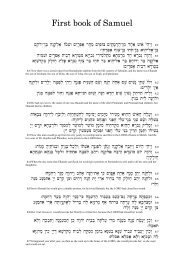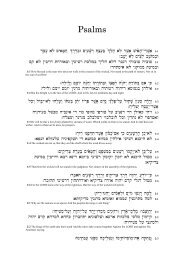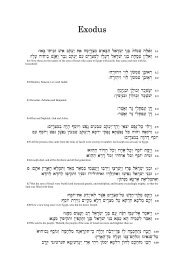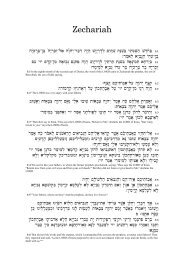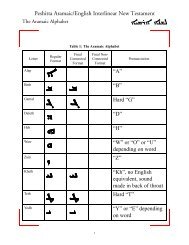Split Words - Peshitta Aramaic/English Interlinear New Testament
Split Words - Peshitta Aramaic/English Interlinear New Testament
Split Words - Peshitta Aramaic/English Interlinear New Testament
You also want an ePaper? Increase the reach of your titles
YUMPU automatically turns print PDFs into web optimized ePapers that Google loves.
<strong>Split</strong> <strong>Words</strong> – Undeniable and Irrefutable Evidence of <strong>Peshitta</strong> Primacy – Part 2<br />
Compiled and edited by Christopher Lancaster and Paul Younan<br />
If after perusing the first article on split words (containing the first 12 examples), you are still unconvinced, here<br />
are plenty more for you to feast your eyes upon.<br />
But before we start, lets take a look at a gem found by Paul Younan. From the notes of the United Bible Society<br />
(which documents many variant readings in the Greek manuscripts):<br />
"TEXT: "You know the word which he sent to the sons"<br />
EVIDENCE: p74 S* C D E P Psi 945 1241 2495<br />
TRANSLATIONS: KJV ASV RSV NASV NIV TEV<br />
RANK: C<br />
NOTES: "You know he sent the word to the sons"<br />
EVIDENCE: Sa A B 81 614 1739 most lat vg cop<br />
TRANSLATIONS: ASVn NASVn NEB<br />
COMMENTS: The difference in the two readings is the inclusion or omission of "which" which is included in<br />
brackets in the UBS text. The text reading is not proper Greek but it is the sort of Greek that one would expect in a<br />
translation from <strong>Aramaic</strong>. Since the last two letters of the Greek word for "word" spell the Greek word for "which,"<br />
it is possible that the word "which" was accidently added when copyists saw those letters twice. On the other hand,<br />
it is also possible that the word "which" was originally present and it was accidently omitted when copyists' eyes<br />
jumped from the end of "word" to the end of "which."<br />
Greek primacists implying that the Greek was translated from the <strong>Aramaic</strong>? So the Greek is not the original? Make<br />
up your minds...<br />
Now with that pleasant surprise out of the way, let us jump straight in!<br />
13. Because, when or since? – John 12:41<br />
Let’s start the new article off with a bang – with another “triple split word”!<br />
The NIV says: “Isaiah said this because he saw Jesus' glory and spoke about him.”<br />
The KJV says: “These things said Esaias, when he saw his glory, and spake of him.”<br />
Versions that say because or a variation thereof: AMP, ASV, BBE, CEV, DARBY, ESV, GodsWord, Holman,<br />
NASB, NIV, NIV-UK, NLT, Rotherham, RSV, TEV, Weymouth.<br />
Versions that say when or a variation thereof: ALT, Douay-Rheims, Geneva, ISV, KJ21, LITV, MKJV, KJV,<br />
NKJV, WE, Webster, Wycliffe, YLT.
Versions that say since or a variation thereof: None that I am aware of. Only one of the major Greek manuscripts<br />
seems to have this reading, so it is not a surprise to find that it is not represented among the <strong>English</strong> versions.<br />
Now, it just so happens that the <strong>Aramaic</strong> word dk can be translated as ‘because’, ‘when’ and ‘since’.<br />
“Another "problem" word in <strong>Aramaic</strong> which has many meanings is the word dk (please see Lexicon, word#<br />
9808.) This word can mean "When, After, While, Where, Since, etc."<br />
If the various Greek manuscripts of Yukhanan's Gospel were translation from the <strong>Aramaic</strong> version of Yukhanan,<br />
we would expect that they would vary in their exact translation of this word, and in fact they do.<br />
The following Greek manuscripts translate it "Because": p66 p75 S A B L X Theta Psi f1 33<br />
The following translate it "When": D, K, Delta, Pi, f13, 565, 700, 892, 1241<br />
And the following manuscript translates it "Since": W<br />
How could Yukhanan have written this in Greek? Doesn't the mere fact that these variances exist mean that the<br />
Greek manuscripts are only translations?” – Paul Younan<br />
Acknowledgements: Thanks to Paul Younan for providing this split word.<br />
14. Beginning or firstfruits? – 2Thessalonians 2:13<br />
The KJV says: “But we are bound to give thanks alway to God for you, brethren beloved of the Lord, because God<br />
hath from the beginning chosen you to salvation through sanctification of the Spirit and belief of the truth:”<br />
The ISV says: “Now at all times we are obligated to thank God for you, brothers who are loved by the Lord,<br />
because God chose you to be the first fruits for salvation through sanctification by the Spirit and through faith in<br />
the truth.”<br />
Versions that say beginning or a variation thereof: ALT, ASV, DARBY, Geneva, GodsWord, Holman, KJ21, KJV,<br />
LITV, MKJV, NASB, NIV, NIV-UK, NKJV, Rotherham, RSV, WE, Webster, Weymouth, YLT.<br />
Versions that say firstfruits or a variation thereof: AMP, ESV, ISV, Wycliffe.<br />
Now, it just so happens that the <strong>Aramaic</strong> word 'reshitha', in the <strong>Peshitta</strong>, can mean ‘beginning’ and ‘firstfruits’,<br />
pointing to an <strong>Aramaic</strong> original to the Greek manuscripts.<br />
“In the <strong>Peshitta</strong> text of 2nd Thes. 2:13 you'll find the word 'reshitha' which has several meanings, but the two I<br />
want to focus on are 'beginning' and 'firstfruits.' The Greek variants prove an <strong>Aramaic</strong> original because some Greek<br />
manuscripts have a word that means 'beginning' and some others have a word that means 'firstfruits.' Nestle-Aland<br />
26th has 'aparchen' defined as follows:<br />
(1) to offer firstlings or firstfruits<br />
(2) to take away the firstfruits of the productions of the earth which was offered to God. The first portion of the<br />
dough, from which sacred loaves were to be prepared. Hence term used of persons consecrated to God for all time.<br />
(3) persons superior in excellence to others of the same class
The Byzantine text and the Textus Receptus have 'arches' which is defined as follows:<br />
(1) beginning, origin<br />
(2) the person or thing that commences, the first person or thing in a series, the leader<br />
(3) that by which anything begins to be, the origin, the active cause<br />
(4) the extremity of a thing<br />
a. of the corners of a sail<br />
(5) the first place, principality, rule, magistracy<br />
a. of angels and demons<br />
Does anyone have another viable explanation for this other than the fact that some Greeks chose one meaning of<br />
'reshitha' (beginning) and some other Greeks chose another meaning (firstfruits)?<br />
ry$ N ry$)<br />
1 passim head<br />
2 passim top<br />
3 ImpArEg,JLAGal,Syr beginning<br />
4 ImpArEg capital funds<br />
5 JLAGal,Syr tip, extremity<br />
6 JLATg,Syr chief<br />
7 Syr firstfruits<br />
8 Syr chapter<br />
9 Syr region<br />
10 Syr center<br />
11 Syr source<br />
12 Syr band<br />
13 Syr best<br />
14 Syr principal organ<br />
15 Syr poison<br />
16 Syr point<br />
17 JLA X %b_%+ X is the responsibility of<br />
18 JLAGal,JLATg choice, first quality<br />
19 JLAGal,JBA first part of a tannaitic statement<br />
20 Syr adv (various)” - Larry Kelsey<br />
Acknowledgements: Thanks to Larry Kelsey for this split word.<br />
15. We shall or let us? – 1Corinthians 15:49<br />
The KJV says: “And as we have borne the image of the earthy, we shall also bear the image of the heavenly.”<br />
The Weymouth says: “And as we have borne a resemblance to the earthy one, let us see to it that we also bear a<br />
resemblance to the heavenly One.”<br />
Versions that say we shall or a variation thereof: ALT, AMP, ASV, DARBY, ESV, Geneva, KJ21, KJV, LITV,<br />
MKJV, NASB, NIV, NIV-UK, NKJV, NLT, RSV, WE, Webster, YLT.<br />
Versions that say let us or a variation thereof: Douay-Rheims, Rotherham, Weymouth.
Now, it just so happens that the <strong>Aramaic</strong> could be translated both ways.<br />
“In <strong>Aramaic</strong>, the future tense can also be used as an exortation (like in the Lord's Prayer, "...Let your kingdom<br />
come; Let you will be done...". Guess what we find in 1st Corinthians 15:49?<br />
1 Corinthians 15:49:<br />
TEXT: "we shall also wear the image of the heavenly One."<br />
EVIDENCE: B I 630 1881 Lect syr(p) cop(south)<br />
TRANSLATIONS: KJV ASV RSV NASV NIV NEB TEV<br />
RANK: C<br />
NOTES: "let us also wear the image of the heavenly One."<br />
EVIDENCE: p 46 S A C D G K P Psi 33 81 104 614 1241 1739 2495 Byz lat vg cop(north)<br />
TRANSLATIONS: ASVn RSVn NASVn NIVn TEVn<br />
Not blatantly obvious, but evidence<br />
” – Steve Caruso<br />
It all depends on how the verb $bln (NeLB’aSH) is translated.<br />
“To understand whether this should be translated "we shall" or "let us" you would have to look at the grammar of<br />
the verb in the verse. For instance 'akha' means 'brother' but as soon as you change that 'a' ending to an 'i' ending<br />
you have 'akhi' and that means 'my brother and when you change the 'a' ending to an 'ay' ending you have 'akhay'<br />
meaning 'my brothers' or 'my brethren'.<br />
The verb is Common Gender, First Person, Plural (hence the 'we' in 'we shall' or the 'us' in 'let us'. The Suffix<br />
Number is Singular, the Verbal Tense is Imperfect (incomplete, ongoing action), and the Verbal Conjugation is<br />
PEAL (the most direct-action verb in <strong>Aramaic</strong> kinda like Qal or Kal is the most direct-action verb in Hebrew,<br />
hence 'shall' in 'we shall' or the 'let' in 'let us'.” – Larry Kelsey<br />
Acknowledgements: Thanks to Steve Caruso for this split word and thanks to Larry Kelsey for the grammar<br />
explanation.<br />
16. Whatsoever place or as many as? – Mark 6:11<br />
This split word is very interesting, as the two main families of Greek texts, Byzantine and Alexandrian, seem to be<br />
split right down the middle. In this verse, the Byzantine texts tend to refer to places, while the Alexandrian texts<br />
tend to speak of people.<br />
The ASV says: “And whatsoever place shall not receive you, and they hear you not, as ye go forth thence, shake<br />
off the dust that is under your feet for a testimony unto them.”<br />
The YLT says: “and as many as may not receive you, nor hear you, going out thence, shake off the dust that is<br />
under your feet for a testimony to them; verily I say to you, It shall be more tolerable for Sodom or Gomorrah in a<br />
day of judgment than for that city.'”
Versions that say whatsoever place, any place or a variation thereof: ASV, BBE, CEV, DARBY, ESV, Holman,<br />
ISV, NASB, NIV, NIV-UK, Rotherham, RSV.<br />
Versions that say as many as, whoever, whosoever or a variation thereof: ALT, Douay-Rheims, Geneva, KJ21,<br />
KJV, LITV, MKJV,NKJV, Webster, Wycliffe, YLT.<br />
Now, it just so happens that the <strong>Aramaic</strong> root nm can mean both.<br />
“Here is another verse where the Byzantine Majority text and both Stephens and Scrivener's Textus Receptus are<br />
all in agreement but the Alexandrian text has another reading.<br />
The phrase that is different in the Alexandrian text reads as follows:<br />
ος αν τοπος µη δεξηται ('whatsoever place will not receive')<br />
The Byz. Maj. and Stephens / Scrivener Textus Receptus have<br />
οσοι αν µη δεξωνται ('as many as will not receive')<br />
The answer lies in the way the root 'mn' is handled.<br />
mn P<br />
1 passim who?<br />
mn P<br />
1 passim who?<br />
2 ImpArEg,JLAGal + %zy/dy/d% whoever<br />
mn p<br />
0 passim from<br />
1 passim : direction: place<br />
2 passim : direction: person<br />
3 passim : origin : place<br />
4 passim : origin : person<br />
5 passim : origin : material<br />
6 passim : origin : time<br />
7 passim : agent<br />
8 passim : cause<br />
9 passim : comparative<br />
10 passim : other verbal complements<br />
11 passim : partitive<br />
12 Syr : distributive<br />
13 Palestinian : multiplicative<br />
14 Syr : on the side of<br />
15 Syr : reflexive” – Larry Kelsey<br />
Acknowledgements: Thanks to Larry Kelsey for this split word.<br />
17. Disregarded or heard? – Mark 5:36
This ‘split word’ does not arise due to having one <strong>Aramaic</strong> word that was rendered differently in differing Greek<br />
translations, but is likely caused by similar <strong>Aramaic</strong> words being confused for each other. This idea is strengthened<br />
by the consistent tendency of the Byzantine manuscripts to read ‘heard’ while the Alexandrian manuscripts tend to<br />
say ‘disregarded’.<br />
The NIV says: “Ignoring what they said, Jesus told the synagogue ruler, "Don't be afraid; just believe."”<br />
The KJV says: “As soon as Jesus heard the word that was spoken, he saith unto the ruler of the synagogue, Be not<br />
afraid, only believe.”<br />
Versions that say disregarded, ignored or a variation thereof: ASV, BBE, NIV, NIV-UK, NLT, RSV, TEV,<br />
Versions that say heard, overheard or a variation thereof: ALT, CEV, DARBY, Douay-Rheims, ESV, Geneva,<br />
GodsWord, Holman, ISV, KJ21, KJV, LITV, MKJV, MSG, NASB, NKJV, Rotherham, WE, Webster, Weymouth,<br />
Wycliffe, YLT.<br />
“The Byzantine Majority text as well as the Stephens and Scrivener Textus Receptus all read the same for Mark<br />
5:36. Where these texts differ from the Alexandrian text is rather amusing.<br />
The Alexandrian text has παρακουσας ('having disregarded')<br />
The three texts listed above have ευθεως ακουσας ('having heard')<br />
The corresponding word in the <strong>Peshitta</strong> is (m4<br />
The entries from CAL are as follows:<br />
$m( V<br />
011 passim to hear<br />
012 Syr to listen<br />
013 Syr to hold a hearing<br />
014 Syr to obey<br />
015 Syr %(am% to converse with<br />
016 passim to understand<br />
017 JBA $my( l- he heard, knew<br />
018 JBA mN to infer<br />
041 passim to be heard<br />
042 Syr to be famous<br />
043 Syr to be known<br />
044 Syr to listen<br />
045 Syr to obey<br />
021 Syr to announce<br />
051 Syr to receive an announcement<br />
031 passim to cause to hear<br />
032 Syr to announce<br />
033 Syr to cause to obey<br />
034 JBA to give to understand<br />
035 JBA to infer
In my efforts to figure out what <strong>Aramaic</strong> word the Greek translators might have gotten confused the closest I could<br />
come to 'having disregarded' is when I entered 'ignore' in the <strong>English</strong>-to-<strong>Aramaic</strong> search link on the CAL site.<br />
The results that strongly favored 'shme' (hear / heard) are listed below:<br />
smy V<br />
011 Syr to lose light<br />
021 Syr,Palestinian,CPA,Sam,JBA to blind<br />
022 JBA to repudiate<br />
023 JLAGal to ignore<br />
051 JLAGal,Syr to be blinded<br />
052 Syr to feign blindness<br />
053 Syr to be blind<br />
031 Syr to be blind<br />
032 Syr to be lame<br />
My theory (that I wish I could prove) is that the translators of the Alexandrian text confused 'smy' (ignore /<br />
disregard) with 'shme' (hear)” – Larry Kelsey<br />
Acknowledgements: Thanks to Larry Kelsey for this split word.<br />
18. I or she? – Luke 7:45<br />
This split word also has a little ‘extra spice’…<br />
The KJV says: “Thou gavest me no kiss: but this woman since the time I came in hath not ceased to kiss my feet.”<br />
The Wycliffe says: “Thou hast not given to me a kiss; but this, since she entered, ceased not to kiss my feet.”<br />
Versions that say I: ALT, AMP, ASV, BBE, CEV, DARBY, ESV, Geneva, GodsWord, Holman, ISV, KJ21, KJV,<br />
LITV, MKJV, MSG, NASB, NIV, NIV-UK, NKJV, NLT, Rotherham, RSV, TEV, Webster, YLT.<br />
Versions that say she: Douay-Rheims, WE, Wycliffe.<br />
“Lk 7:36-50 (The sinful woman in Simon the Pharisee house). As usually --since I became a “<strong>Peshitta</strong>-holic”--,<br />
while preparing my sermon, I consulted the <strong>Peshitta</strong> and I found this interesting issue in v. 45:<br />
(For you) KJV: ...but this woman since the time I came in hath not ceased...<br />
Greek NA27 “canonized” text:<br />
...But this (woman) since SHE entered (SHE) didn’t stop...<br />
αυτη δε αφης εισηλθον ου διελιπεν<br />
The variant:<br />
L* f1.13 al lat (some latins) SyP SyH Sa(mss) bo (pt)<br />
...But this (woman) since I entered (she) didn’t stop...<br />
αυτη δε αφης εισηλθεν ου διελιπεν
Let’s see now the <strong>Peshitta</strong> Text:<br />
...tyl4 f tl9d Nm 0h Nyd 0dh<br />
It’s all about the verb l9 (to enter). Notice that both FIRST (common) and THIRD FEMENINE (and also 2nd<br />
Masculine, but it isn’t relevant here) persons of the singular Perfect Peal, tl9 , WITHOUT VOWELS ARE THE<br />
SAME!<br />
So, in this case:<br />
tle9 (‘alth) = You (m) entered<br />
telO9 (‘elath) = She entered<br />
tOlO9 (‘eleth) = I entered<br />
Therefore, this could confuse Zorba, poor fellow. ANOTHER PROVE OF THE ARAMAIC PRIORITY!” –<br />
Valentin Sanz Gonzalez<br />
The Greek manuscript containing the rare “she” reading, is manuscript B (Beza 1598).<br />
Now this verse contains an important split word, that exposes a contradiction among the Greek manuscripts, and<br />
demonstrates how the Greek manuscripts involved are derived from the <strong>Aramaic</strong> original. It gets better! A few<br />
verses earlier, we see a beautiful ‘word play’. Who said that our LORD was not a poet?<br />
“There is a word play here, too. Did you catch it?<br />
Luke 7:41-42<br />
0bwx 0rm dxl wwh ty0 0byx Nyrt<br />
There were two debtors to a certain creditor<br />
00m4mx 0rnyd 0wh Byx dx<br />
One owed him 500 dinarii<br />
Ny4mx 0rnyd 0nrx0w<br />
And the other, 50 dinarii<br />
Qb4 Jwhyrtl (rpml Jwhl 0wh tyldw<br />
And because they had nothing with which to repay, he forgave them both<br />
Yhwybxn ryty Jwhnm Lykh 0ny0<br />
Which of them, therefore, will love (hint: owe) him most?
Translation doesn't do justice.” – Rob Vanhoff<br />
Debtors (0byx), creditors (0bwx 0rm), owe (Byx) and love (Yhwybxn), all come from the same <strong>Aramaic</strong><br />
root: Bx So who will love him the most and who will owe him the most? What a poet!<br />
Acknowledgements: Thanks to Valentin Sanz Gonzalez for this split word, and thanks to Rob Vanhoff for the word<br />
play.<br />
19. Walking or passing on? – Mark 1:16<br />
The Wycliffe says: “And as he passed beside the sea of Galilee, he saw Simon, and Andrew, his brother, casting<br />
their nets into the sea; for they were fishers.”<br />
The NIV says: “As Jesus walked beside the Sea of Galilee, he saw Simon and his brother Andrew casting a net into<br />
the lake, for they were fishermen.”<br />
Versions that say walk or a variation thereof: ALT, CEV, DARBY, Geneva, ISV, KJ21, KJV, LITV, MKJV, NIV,<br />
NIV-UK, NKJV, NLT, TEV, WE, Webster, YLT.<br />
Versions that say passing or a variation thereof: AMP, ASV, Douay-Rheims, ESV, Holman, MSG, Rotherham,<br />
RSV, Weymouth, Wycliffe.<br />
Now, it just so happens that the root of Klmh in the <strong>Aramaic</strong> <strong>Peshitta</strong> can mean both.<br />
“The Byzantine Majority text of Mark 1:16 as well as Stephens and Scrivener's Textus Receptus start with<br />
"Περιπατων δε..." ("And walking...")<br />
while the Alexandrian text has "και παραγων..." (and passing on...")<br />
The corresponding word in the <strong>Peshitta</strong> is Klmh the root of which means 'walk' but has some other meanings as<br />
well.<br />
hlk V<br />
011 ImpArMesop,BibAr,MiddleAr,Palestinian to go, to proceed<br />
012 Syr to go back<br />
021 ImpArEg,BibArDan,JLAGal,JLATg,Syr to walk 022 JLATg,Syr to spread<br />
023 Syr to go away<br />
024 Syr to pass<br />
025 Syr to live<br />
026 Syr to make to go<br />
027 Syr to lead<br />
028 Syr to turn about<br />
051 JLAGal,JLATg to walk about<br />
The editions that have "and passing on" instead of "And walking" are as follows:
Lachmann 1842, Tischendorf 1869, Tregelles 1857, Alford 1849 as revised in 1871, Westcott & Hort 1881,<br />
Collation in progress of Nestle 1927 as revised in 1941 (17th). Nestle-Aland 1979 (Aland et al. 1979)” – Larry<br />
Kelsey<br />
Acknowledgements: Thanks to Larry Kelsey for this split word.<br />
20. Paraptoma or hamartia? – James 5:16<br />
This is one of the many ‘synonym split words’, as I like to call them. The whole point of these articles, is to<br />
demonstrate how the various Greek texts are filled with variants because of being differing translations from the<br />
<strong>Peshitta</strong>. Now, one thing you will expect to see in different translations of the same text, are synonym variants. For<br />
example, when different translations of a German car manual are being made into <strong>English</strong>, you may find that the<br />
German word for car, ‘auto’, may be translated in the different <strong>English</strong> versions as ‘car’, ‘automobile’ or ‘vehicle’.<br />
In fact, in a work as large as the Bible, one would expect to find many such synonym variants. This example is but<br />
one of many.<br />
The KJV says: “Confess your faults one to another, and pray one for another, that ye may be healed. The effectual<br />
fervent prayer of a righteous man availeth much.”<br />
Note: As this deals with Greek synonyms, there is no significant difference to show among the <strong>English</strong> Bible<br />
versions.<br />
Now, as the two different words in the Greek texts (paraptoma and hamartia) have pretty much the same meaning<br />
(synonyms), they obviously stem from the same <strong>Aramaic</strong> word, Jwktwlks<br />
“The Greek texts differ on a word in James 5:16 that makes for an interesting study in relationship to the <strong>Peshitta</strong>.<br />
James 5:16 starts with "Confess your faults one to another..." The Textus Receptus of Stephens 1550 and Scrivener<br />
1894 as well as the Byzantine Majority text have παραπτωµατα while the Alexandrian text has αµαρτιας<br />
Strong's defines 'paraptoma' as a side-slip (lapse or deviation),i.e., (unintentional) error or (wilful) transgression.<br />
This lines up with the corresponding word in the <strong>Peshitta</strong> very well.<br />
Word Number: 14408<br />
Pronunciation: (Eastern) SaK,LOaT,K,uON (Western) SaK,LOoT,K,uON<br />
Meaning:: error, foolishness, transgression, trespass, wrong-doing, sin<br />
The word in the Alexandrian text, hamartia also lines up very well with the <strong>Aramaic</strong> word 'sakh-lowth-khon.'<br />
Here's Thayer's entry for 'hamartia':<br />
1) equivalent to G264<br />
1a) to be without a share in<br />
1b) to miss the mark<br />
1c) to err, be mistaken<br />
1d) to miss or wander from the path of uprightness and honour, to do or go wrong<br />
1e) to wander from the law of God, violate God's law, sin<br />
2) that which is done wrong, sin, an offence, a violation of the divine law in thought or in act<br />
3) collectively, the complex or aggregate of sins committed either by a single person or by many
So we have two Greek words springing from one <strong>Aramaic</strong> word in James.” – Larry Kelsey<br />
Acknowledgements: Thanks to Larry Kelsey for this split word.<br />
21. Of salvation or of life? – Matthew 16:16<br />
The KJV says: “And Simon Peter answered and said, Thou art the Christ, the Son of the living God.”<br />
Note: Once again, the <strong>English</strong> versions demonstrating the variant are not shown, as the variant lies in the Greek<br />
texts, and most <strong>English</strong> versions read very similarly.<br />
The Alexandrian and Byzantine texts usually have ζωντος in the verse, signifying “God of life” or “God the living<br />
One”, while the Codex Bezae (D) has σωζοντος in Matthew 16:16, signifying “God of salvation” or “God the<br />
Saviour”. The <strong>Peshitta</strong> has 0yx which literally means ‘life’. When comparing the two words, it doesn’t seem<br />
probable that a Greek copyist just copied the word wrongly from one Greek text to another. It is more likely that<br />
the Zorbans translating the Codex Bezae from the <strong>Aramaic</strong> original had meant to say ‘salvation’ instead of ‘life’. In<br />
<strong>Aramaic</strong>, there really is no word for ‘salvation’. They just use the word for ‘life’, as shown here from the<br />
Comprehensive <strong>Aramaic</strong> Lexicon:<br />
xy) N > xyyn<br />
xyyn N<br />
1 passim life<br />
2 Syr salvation<br />
LS2 229<br />
LS2 V: xay:e)<br />
xy) a<br />
1 JBA rapidly<br />
form: hyy) !<br />
This Greek variant clearly points to an <strong>Aramaic</strong> original.<br />
Acknowledgements: Thanks to the LORD for giving me this split word..<br />
22. Alms or righteousness? – Matthew 6:1<br />
The KJV says: “Take heed that ye do not your alms before men, to be seen of them: otherwise ye have no reward<br />
of your Father which is in heaven.”<br />
The NIV says: “"Be careful not to do your 'acts of righteousness' before men, to be seen by them. If you do, you<br />
will have no reward from your Father in heaven.”<br />
Versions that say alms: DARBY, Geneva, KJ21, KJV, Webster.<br />
Versions that say righteousness: ASV, ESV, Holman, ISV, NASB, NIV, NIV-UK, Rotherham, Wycliffe.<br />
Now, it just so happens that the <strong>Aramaic</strong> root qdz can be translated to mean both.
“The two Greek words translated from the <strong>Aramaic</strong> root 'zdq' look absolutely nothing alike. Akhan Paul translated<br />
Jwktqdzb as "in your almsgiving" in his interlinear.<br />
The variants in the Greek text, resulting from the different meanings that the <strong>Aramaic</strong> 'zdq' has, are as follows:<br />
δικαιοσυνην---dikaiosunē---dik-ah-yos-oo'-nay [as in the Alexandrian texts - Chris]<br />
Thayer Definition:<br />
1) in a broad sense: state of him who is as he ought to be, righteousness, the condition acceptable to God<br />
1a) the doctrine concerning the way in which man may attain a state approved of God<br />
1b) integrity, virtue, purity of life, rightness, correctness of thinking feeling, and acting<br />
2) in a narrower sense, justice or the virtue which gives each his due<br />
ελεηµοσυνην---eleēmosunē---el-eh-ay-mos-oo'-nay [as in the Byzantine texts - Chris]<br />
Thayer Definition:<br />
1) mercy, pity<br />
1a) especially as exhibited in giving alms, charity<br />
2) the benefaction itself, a donation to the poor, alms<br />
The editions that read "righteousness" instead of "alms" are as follows:<br />
Griesbach 1805, Lachmann 1842, Tischendorf 1869, Tregelles 1857, Alford 1849 as revised in 1871, <strong>Words</strong>worth<br />
1856 as revised in 1870, Westcott & Hort 1881, Collation in progress of Nestle 1927 as revised in 1941 (17th),<br />
Nestle-Aland 1979 (Aland et al. 1979).” – Larry Kelsey<br />
Acknowledgements: Thanks to Larry Kelsey for this split word.<br />
23. Heart or understanding? – Ephesians 1:18<br />
This is a very exciting split word, as the Greek variant is caused by an <strong>Aramaic</strong> idiom!<br />
The NIV says: “I pray also that the eyes of your heart may be enlightened in order that you may know the hope to<br />
which he has called you, the riches of his glorious inheritance in the saints,”<br />
The KJV says: “The eyes of your understanding being enlightened; that ye may know what is the hope of his<br />
calling, and what the riches of the glory of his inheritance in the saints,”<br />
Versions that say heart or a variation thereof: ALT, AMP, ASV, BBE, CEV, DARBY, Douay-Rheims, ESV,<br />
Holman, ISV, NASB, NIV, NIV-UK, NLT, Rotherham, RSV, Wycliffe.<br />
Versions that say understanding or a variation thereof: Geneva, MKJV, KJ21, KJV, NKJV, Webster, Weymouth,<br />
YLT.
Now, it just so happens that the <strong>Aramaic</strong> phrase Jwktwbld 0ny9 is an idiom, and as such, can have a literal<br />
translation, and a meaningful translation.<br />
“Many times we have spoken of the Semitic understanding of the heart, that it is the idiomatic organ of<br />
understanding and knowledge.<br />
In Ephesians 1:18, Paul uses this Semiticism:<br />
Jwktwbld 0ny9 (Ayna d'Lebwatkon - "the eye of your hearts")<br />
[The Alexandrian manuscripts (including Tischendorf, Westcott & Hort and Nestle-Aland) tend to literally retain<br />
this <strong>Aramaic</strong> idiom, while the Byzantine texts give a meaningful translation. – Chris]<br />
This clearly demonstrates that Zorba sometimes understood that Paul was using an <strong>Aramaic</strong> idiom, and chose to<br />
liberally translate the meaning into a more acceptable solution in Greek thought.” – Paul Younan<br />
Acknowledgements: Thanks to Paul Younan for providing this split word.<br />
24. Bowels or love? – Philippians 1:8, 2:1 / Colossians 3:12 / Philemon 7, 12, 20 / 1John 3:17 /<br />
2Corinthians 6:12<br />
This example is not really a split word, more of a “pseudo split word”, as the variant in question (at least to my<br />
knowledge) does not occur in the Greek (just about all Greek versions read “bowels”). It does occur though in the<br />
<strong>English</strong> versions. The Byzantine versions tend to say “bowels”, while the Alexandrian versions tend to say “love”.<br />
That the variant is caused by differing translations of an <strong>Aramaic</strong> idiom, is indicative of an <strong>Aramaic</strong> original,<br />
undermining the Greek.<br />
However, this example is quite amazing, as it runs throughout many <strong>New</strong> <strong>Testament</strong> books, and is evidence of<br />
<strong>Aramaic</strong> originality to letters sent to Christians in Greek cities! It also is an example of where an idiom is translated<br />
literally in some versions, and meaningfully in others. This phenomenon occurs in many verses, but for simplicity,<br />
we shall discuss only Philippians 1:8.<br />
The KJV says: “For God is my record, how greatly I long after you all in the bowels of Jesus Christ.”<br />
The NIV says: “God can testify how I long for all of you with the affection of Christ Jesus.”<br />
Versions that say bowels, entrails or a variation thereof: ALT, DARBY, Douay-Rheims, KJV, MKJV, Webster,<br />
Wycliffe, YLT.<br />
Versions that say love, compassion, affection, mercy or a variation thereof: AMP, ASV, BBE, ESV, GodsWord,<br />
Holman, ISV, KJ21, LITV, NASB, NIV, NIV-UK, NKJV, NLT, Rotherham RSV, Weymouth.<br />
Now, it just so happens that the <strong>Aramaic</strong> root Mxr can be meant literally or as part of an idiom.<br />
“CAL Outline Lexicon: GENERAL rxm<br />
rxm N rxm)
1 passim friend<br />
LS2 724<br />
LS2 v: rAxmA)<br />
rxm#2 N rxm)<br />
1 Syr womb<br />
2 Syr intestines<br />
3 Syr genitals<br />
4 Syr mercy > rxmyn<br />
5 Syr love<br />
LS2 724<br />
LS2 v: raxmA)<br />
abs. voc: rxem<br />
rxm V<br />
011 passim to love<br />
012 Syr to have pity on<br />
013 Syr to desire<br />
013 JLAGal,JLATg to like s.t.<br />
014 Syr to prefer<br />
041 Syr to be loved<br />
042 Syr to obtain mercy<br />
043 Syr to be moderated<br />
021 JLAGal,JLATg,Syr,JBA w.%(l% to have mercy<br />
022 Syr to strive for mercy<br />
023 JBA to love<br />
024 JBA to give suck<br />
051 JLAGal,Syr to be pitied<br />
031 Syr to have pity<br />
032 Syr to make to love<br />
033 Syr to make beloved<br />
LS2 723” – Andrew Gabriel Roth<br />
“As the heart is viewed as the seat of the intellect, the bowels are viewed as the seat of compassion.” – Paul<br />
Younan<br />
Acknowledgements: Thanks to Andrew Gabriel Roth for this split word.<br />
Well, that brings us to the end of our discussion on split words. Fret not, for there are many more linguistic proofs<br />
of <strong>Aramaic</strong> primacy! – Christopher Lancaster



